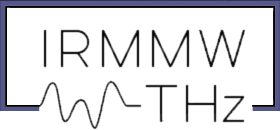The IRMMW-THz Conference Best Student Paper Awards
In 2011 the IRMMW-THz Society Board voted to implement an annual “Best Student Paper Prize” to recognize original contributions to the conference from outstanding student attendees. The prize is awarded to 1st, 2nd and 3rd place papers through a committee selection and voting process. Each candidate must present his/her paper to the awards review committee at the conference during which the award is presented. Winners are announced at the banquet or at one of the conference Plenary sessions. Entry rules and procedures are posted on the local conference website in advance of the final paper submission deadline. Candidates may submit their entry when they upload their abstract.
THE 2025 STUDENT PAPER PRIZE FINALISTS:
FINALISTS for 2025 (At IRMMW-THz 2025 in Helsinki, Finland):
DISCOVERY TRACK
FIRST PLACE: “Ultrastrong THz Light-Matter Interaction Between a Single Meta Atom and Landau Level Transitions in a GaAs quantum well and Monolayer Graphene”, Alexa Jöchl, ETH Zurich, Switzerland.
SECOND PLACE: “Subcycle Band-Structure Videography of IR-driven Graphene”, Vincent Eggers, University of Regensburg, Germany
RUNNER-UP: “THz Frequency Conversion Using HgTe Heterostructures”, Tatiana Aureliia Uaman Svetikova, Helmholtz-Zentrum Dresden-Rossendorf, Technische Universität Dresden, Germany.
RUNNER-UP: “Ultrafast THz-control Of Exciton And Multiexciton Dynamics In Quantum Dots”, Fabian Brütting, University of Bayreuth, Germany.
APPLICATION TRACK
FIRST PLACE: “10 mW of THz Power Using Photoconductive Connected Array Source Excited by a 515 nm Laser at 91 MHz Repetition Rate”, Martijn Huiskes, Technical University of Delft, Netherlands.
SECOND PLACE: “Ultrafast Terahertz Dynamics of Dangling Bonds on the Si(100)-2×1 Surface”, Howe Simpson, University of Alberta, Canada.
RUNNER-UP: “Phase Measurement Via Terahertz Parametric Detection“, Fuma Kawano, Nagoya University, Japan.
RUNNER-UP: “Photonic Integrated Terahertz Spectrometer With Kilohertz Measurement Rate At Discrete Frequencies”, Lauri Schwenson, Heinrich Hertz Institute, Berlin, Germany.
